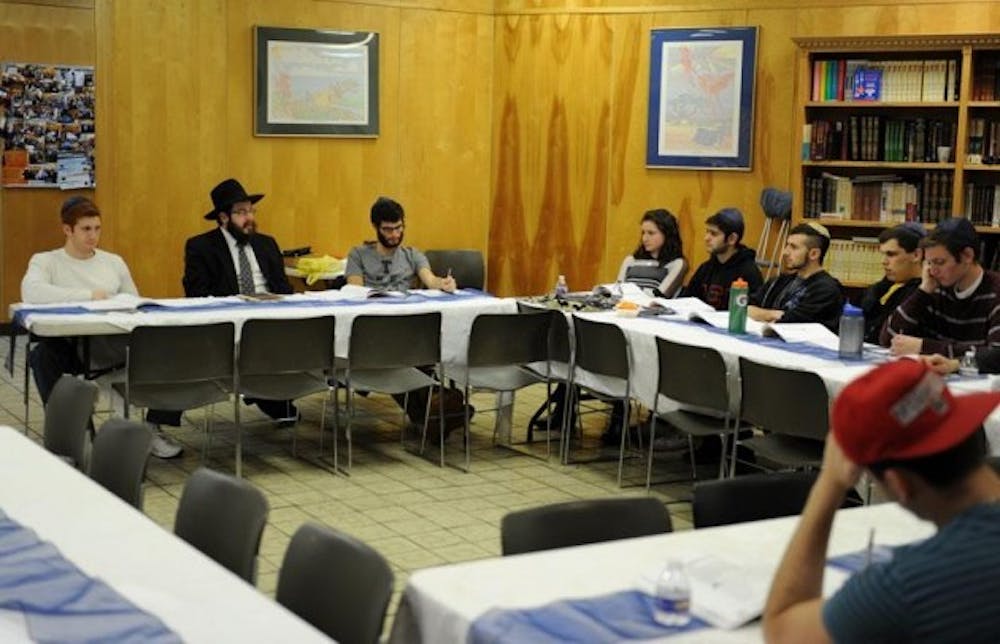Alexandra DeFeo, a senior communication major, has a reason to believe in God.
Three of her friends were driving down the highway in a yellow Hummer. The driver almost missed the exit, so she swerved to make it. She lost control of the wheel and her car flipped three times, landing upside down.
All three of DeFeo's friends left the scene uninjured.
In DeFeo's first class at Chabad's Sinai Scholars program, she had the opportunity to reflect on that day and explain why she feels a connection with God.
In the program, students are offered a $350 stipend as an incentive to explore their Jewish background and study each of the Ten Commandments.
Approximately 25 UB students visit the Chabad house, located near UB's North Campus, each Monday from 7:30-9:30 p.m. to learn more about the history of their ancestors and faith through the Sinai Scholars program. At every meeting, the students discuss one of the Ten Commandments in Judaism and perform various related activities.
Jenna Harsanyi, a sophomore communication and political science major, visited Israel last year from May 27 to June 8. The journey renewed her passion for her Jewish heritage.
After leaving Israel, Harsanyi had trouble finding a place to continue learning about her ancestors' history. Then she learned about the Chabad's Sinai Scholars program.
"I think it's very important to be educated in what you believe in," Harsanyi said.
Rabbi Avrohom, who has instructed Sinai Scholars students since the program began in 2007, believes the program works as a continuation of Hebrew school, in which students explore the fundamentals of Judaism.
"The goal of Sinai Scholars is to give students the opportunity to study their heritage and identity as Jews," Avrohom said.
During their first lesson, students discussed whether they believe in God's real existence or as a concept. The topic sparked debate and reevaluation of beliefs.
Sinai Scholars uses lecture-based courses and hands-on activities to educate its students. The eight weeks of study, which take place in the beginning of the fall and spring semesters, focus on the Ten Commandments as well as the scholarly examination of Judaic texts.
Michelle Rothstein, a sophomore psychology and political science major, started trying to get into the Sinai Scholars class last semester. She's excited to have been accepted this spring.
She learned about the Ten Commandments when she was younger, but now that she's older she wants to revisit the commandments to understand them on a deeper level, she said.
Before the first Sinai Scholars discussion, Rothstein did not care much about keeping kosher. Now, when she eats something that's kosher, she said she feels that she's doing something right and honorable.
On Monday, students engaged in deep discussion regarding Shabbat and the importance of taking Saturday off during each week to simply relax. The rabbi explained the importance of turning off cellphones and all other electronic devices to disconnect from the rest of the world. The "day off" is inspired by the Jewish belief that God created the world in six days and then took the seventh day off to rest.
Some students vowed to rest their eyes and minds from their electronic devices one day each week, according to Harsanyi.
During their time in the program, students are privileged to a special visit to a mikvah, a traditional Jewish pool. They are also invited to attend Shabbat dinners and take part in a yearly retreat, in which they meet scholars from chapters worldwide. Avrohom also plans events with guest speakers and dinners with the faculty at the Chabad House.
Joseph Wilner, a junior business major, was drawn to the program because of its thought-provoking, open discussions. He believes it has allowed him not only to learn about his Jewish culture, but also take an active part in open forums.
"Talking about religion is usually taboo," Wilner said. "But it's presented in an open dialogue, and everyone has a voice."
Rabbi Avrohom believes the program's importance lies in its educational value, exposing students to a faith that is sometimes ignored.
"Some students haven't studied [Judaism] since their Bar-Mitzvah; some never went to Hebrew School," Avrohom said.
When studying the Judaic faith, he believes students must "internalize it, understand it and relate to it."
The Sinai Scholars Program ends with a graduation ceremony, at which students receive their stipend. They are encouraged to continue learning about their faith and culture outside of the classroom setting.
email: features@ubspectrum.com





